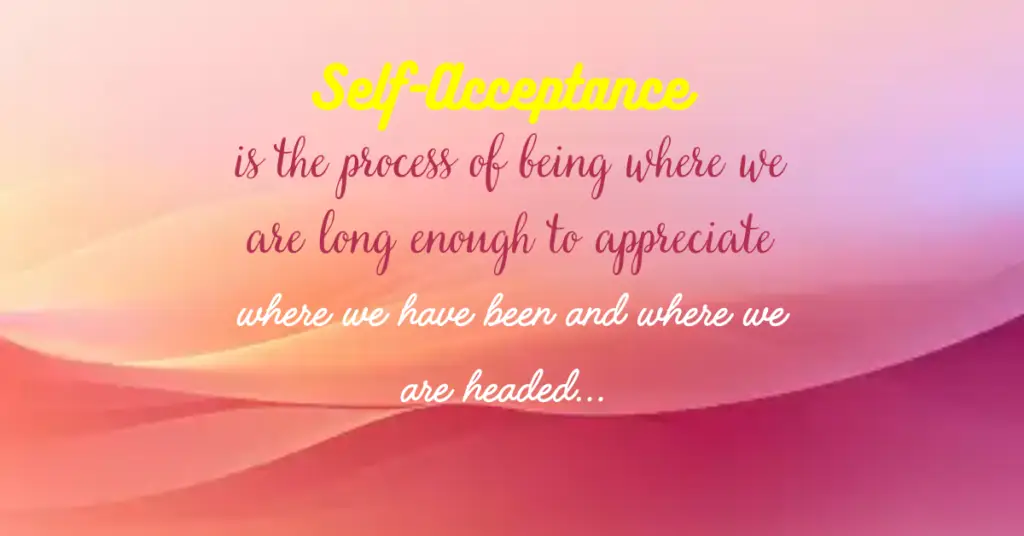Table of Contents
Acceptance Now Is An Art: A Path to Self-Love
A powerful milestone is acceptance in this amazing journey of self-love. But what does acceptance now really mean? At the core of it, it simply means to accept yourself fully, exactly the way you are and the way you are not. With all your qualities, your flaws, your wins and your mistakes. A complete package without any severe judgment. It is choosing to see through the eyes of love and kindness with full honesty, identifying yourself in this very moment and permitting that to be enough.

In the context, of self-love acceptance now does not mean settling for a compromise or accepting your failure. It simply means to accept yourself with full compassion and treat yourself with kindness, backed by a powerful intention. Acceptance now teaches us to let go of perfectionism, unrealistic expectations, the brutal self-talk. With this also never forgetting that imperfection is a part of being human. When you adapt to this kind of thought process, suddenly all your flaws will seem like invitations, opportunities to grow, learn, and evolve.
The practice of acceptance brings us face to face to those hidden parts of ourselves which we find ugly and hard to face. It simply invites us stop resisting ourselves, regardless of it is our personality trait, a mistake in the past, or something about our physical appearance. Acceptance gives us courage to see those aspects with compassion instead of criticism. The inner struggle begins to ease, when we stop rejecting pieces of ourselves. This alteration reduces the emotional tension sourced by self-judgment, and opens the realm of peace, wholeness, and emotional well- being.
Moreover, acceptance now is not job to be done in a moment or a one-time thing, it is a continuous process asking for your attention. Choosing to accept yourself requires a form intentionality, especially when you live in the world full of chaos, perfectionism, and impractical expectations. A more authentic relationship start building when you choose to accept yourself unconditionally. This is a mindset which needs to be cultivated, the one that honors your true self, and grants you freedom, ease and genuinety.
In embracing acceptance now, we open the door to deeper self-love. We learn to treat ourselves with the same kindness and respect that we would offer to a dear friend, creating a foundation for a more fulfilling and balanced life.
The Power of Self-Acceptance Now: A Cornerstone of True Self-Love
Authentic self-love is the foundation on which a healthy, content relationship is built, acceptance now is the cornerstone of authentic self-love. It simply means to accept yourself fully, be it your goodness, your flaws, your mistakes, your accomplishments and this is done with pure heart and without judgment, shame or guilt. When the acceptance is practiced at this level, you make room for yourself to be real, to love yourself in a deeper and authentic manner and above all to be human.

One of the primary benefits of self-acceptance now is its positive impact on mental health. By accepting ourselves, we reduce the internal conflict that arises from self-criticism and negative self-talk. This shift in mindset can lead to lower levels of anxiety and depression, as we are no longer burdened by unrealistic expectations or a constant need for validation. Instead, we can find peace and contentment in simply being who we are.
One of the most powerful benefits of acceptance now is, it helps us increase your resilience. When we end the inner battle with ourselves and let go of the harsh perspective for ourselves, the internal tension begins to ease out. This change helps you to remarkably reduce anxiety, and depression because you have chosen to let go the emotional baggage of impractical expectations, or stopped seeking constant external approval. Instead of struggling to be someone we are not, the acceptance of who we truly are gives you sense of peace and fulfilment.
In addition, acceptance now also opens door to whole new world of authentic living. We feel genuine confidence and more at ease in our own skin when we authentically accept ourselves. This authentic feeling compels us to express who we truly are, we make choices established in our values, and choose relationships which are genuine, real and nourishing. Rather than shrinking back out of fear of judgment or rejection, we are empowered to lead our life with integrity, purpose and a deeper sense of personal freedom.
In summary, self-acceptance now is a vital aspect of true self-love, offering numerous benefits such as improved mental health, greater resilience, and a more authentic life experience. By embracing who we are, we can cultivate a deeper sense of self-worth and live a life that is rich, meaningful, and aligned with our true selves.
Overcoming Self-Judgment: Strategies for Cultivating Compassionate Inner Dialogue
Self-judgment, that brutal inner dialogue which focuses on your flaws, mistakes or not good enough-ness becomes one of the biggest hindrances to self-love and emotional well-being. This negative chatter mostly runs in the background, characterizing your self-image and limiting your confidence without you even understanding.
To build a loving, compassionate and supportive relationship with self, it is important to learn to conquer self-judgment. When you start to gently challenge and become aware of these self-sabotaging thoughts you make a shift your inner dialogue from punishing to nurturing.
Below are some strategies to help you recognize negative self-talk, quiet the inner critic, and cultivate a kinder, more empowering inner voice.

1. Recognize and Challenge Negative Self-Talk
The first step is awareness, awareness of conquering self-judgment when it shows up. Pay close attention to your inner talk and observe the moments when your thoughts shift to negative chatter or self-criticism. The moment you identify them, gently ask, are my thoughts sourced from reality or are they manipulated by impractical expectations? Numerous negative self-talks emerge from thinking errors, like all or nothing thinking, amplifying mistakes, or assumption of worst-case scenario. When you recognize and challenge these thought patterns, you start to get yourself out of their grip and make room for a balanced and more compassionate outlook.
2. Practice Mindfulness
Mindfulness is a practice of paying full attention to the present moment without any judgment. It is the process where you are fully present when the negative self-talk appears, practicing mindfulness proves to be helpful. When you witness a self-critical thought emerging, you have an opportunity to practice mindfulness, acknowledge it rather than getting overpowered by it. This gentle, static approach makes a space between you and the thought, letting you see it more clearly and objectively. Gradually, this awareness practice weakens the impact of negative thinking and helps you respond with deep clarity and gentleness.
3. Reframe Negative Thoughts
Reframing in other words restructuring is a technique in which you choose to consciously change the description of thoughts. For example, if you observe yourself thinking, “I always fail,” you can restructure it to, “I am a student of life, learning and growing from my experiences.” When you consciously choose to shift your thoughts from a sabotaging thought to a more constructive, balanced and a kind perspective it can help weaken the power of self-judgment and adopt a more supportive self-talk.
4. Self-Compassion Practices
Self-compassion simply means extending the kindness and understanding to yourself, exactly the way you would offer to a friend. When you observe yourself trapped in self-criticism, pause and visualize your response to a friend of yours trapped in the same self-sabotaging conversations, blabbering the same thing about themselves. Your natural response would be reassuring, being empathetic, and encouraging so it is now time to be graceful and kind towards yourself. Reminding yourself that mistakes are always part of the human journey and being imperfect cannot reduce your worth. Eventually, this needed compassionate inner self talk will become a powerful remedy to self-judgment.
5. Develop a Gratitude Practice
Shifting your attention appreciation for yourself helps you soften the burden of self-judgment. Make a regular routine to embrace your strengths, your achievements, and the traits that make you who you are. This habit will not only fuel the needed strength in your self-esteem but also gradually shift your focus away from negativity.
Conquering self-judgment is a slow journey which demands time. It will ask for patience, consistency and kindness. By intertwining these tactics into your daily routine, you start to build a kinder and sensitive internal relationship. And in due course, a new realm of deeper self-acceptance and a more authentic, grounded sense of self-love.
Acceptance and Personal Growth: Building a Foundation for Change
Acceptance and personal growth considered opposites, but truth to be told it is a beautiful combination which works together. It is actually two sides of one coin. Self-acceptance is not about being the same way of not working on your improvement, instead it about laying the foundation, honest start points. When you authentically embrace both your strengths and your flaws, you ingrain a balanced understanding of who you are. That is the place of clarity and compassion, where real growth is made possible. Acceptance gives you the stability you need to evolve with intention and authenticity.

Acceptance Now as a Starting Point
Acceptance now is recognizing who we are in the present moment, our skills, qualities, past experiences, and even our limitations with zero judgment. This honest self-analysis is vital because it will show us the where to truly begin. By identifying both our strengths and the areas which needs growth, we create convincing foundation for setting meaningful goals. With this clarity, we can follow personal growth in a way that feels authentic, intentional and aligned with who we really are.
Embracing Strengths and Weaknesses
A core aspect of acceptance now is adopting both our strengths and flaws. We can use them intentionally when we identify our strengths. The recognition helps you build confidence, achieve your goals and create velocity in your game. Equally important is recognizing our flaws, our weaknesses, not coming from shame or guilt but aspects where you need to grow. Balance in our perspective of both strengths and weaknesses keeps us rooted. It saves us to avoid extremes arrogant self-image on one side and severe self-criticism on the other. Both the way of living holds us back. In fact, it helps us to grow from the place of uprightness, humbleness and self-awareness.
Creating a Stable Foundation
Acceptance now creates a stable foundation for growth because it is rooted in reality. When we accept ourselves, we reduce the energy wasted on denial, self-criticism, or striving for unattainable perfection. This stability frees us to focus on constructive change, as we are not constantly battling internal conflicts. With a clear and compassionate understanding of ourselves, we are better positioned to set realistic and achievable goals.
Fostering a Growth Mindset
Acceptance now provides a robust groundwork for growth because it is established in truth, to see ourselves from the eyes of clarity and compassion. When there is total acceptance of who we are truly, we refuse to waste our energy on denial, harsh self-criticism, or chasing unrealistic goals. This equanimity sets your emotional and mental space free for real, constructive change. Instead of dealing with internal turmoil, we can focus on meaningful action. With this clarity, we equip ourselves to set and achieve realistic goals with alignment of who we truly are.
Leading a Fulfilling Life
Finally, acceptance now and personal growth operate collectively to bring a balanced and fulfilling life. Acceptance opens doors to live true to yourself, without the burden of pretence or striving to meet societal standards. Acceptance now helps to nurture self-compassion and an authentic understanding of who we truly are. We are aware of the traits that are necessary for true well-being. From this place of groundedness, self-development becomes easier and more meaningful. With acceptance now, as the foundation, we carry on with our journey of evolvement, adaptation, and enriching our lives in ways that feel aligned and deeply purposeful.
In summary, acceptance now is not about complacency; it’s about creating a realistic and compassionate view of ourselves that serves as the foundation for ongoing personal growth and self-improvement. Embracing both our strengths and weaknesses leads to a more balanced, resilient, and fulfilling life, where we can pursue our true potential with clarity and confidence.
Practical Steps to Cultivate Acceptance Now: Embracing Yourself Daily
Cultivating acceptance is a vital aspect of personal growth and self-love, and it involves consciously integrating practices that help us embrace ourselves fully. Here are some actionable steps you can take to nurture acceptance in your daily life:

1. Journaling for Self-Reflection
Journaling is the most powerful and incredible to tool for self-introspection and nourishing acceptance. Ensure to take few minutes from your day to write about your creative ideas, thoughts, emotions and experiences. Utilize this time to discover your strengths, recognize your challenges, and express gratitude for all that is happening in your life. As you document your journey, you will discover your own mental designs, times of self-judgment, moments of self-love, and the progress and evolvement you are silently making. These perceptions deepen your understanding of yourself and support your continued growth.
2. Practice Mindfulness Meditation
Mindfulness meditation is a tool which increases your awareness about your thoughts and emotions without any judgment. If you are a beginner, start with a short 5-minute daily meditation where you focus only on your breath and observe your thoughts as they show up. The aim is not to get rid of negative thoughts but to acknowledge them and allow them to pass by without indulging in them. This practice nurtures an accepting mindset towards yourself and your experiences.
3. Set Realistic Expectations
Most of the times, self-judgment comes from holding ourselves to unreasonable expectations. In the journey of acceptance, the first thing to focus on is setting goals which are attainable and practical. Reminding yourself that perfection is not possible and falling and making mistakes are part of the journey is so important. Making failing normal so that it eases out your journey. Do not chase big goals, break it into small chunks which are actionable, and celebrate every bit of your progress. This tender approach decreases the pressure and enables you to see your talents and accomplishments with compassion, kindness and clarity.
4. Affirmations and Positive Self-Talk
Embody positive affirmations and supportive self-talk in your daily life. Create a reminder system to remind you of your worth and acceptance, begin your day with it. Affirmations like, “I am enough”, I accept myself exactly as I am”, or “I am growing everyday”. When tough times comes and you find yourself indulging in negative self-talk, gently counter them with these auto suggestive phrases. Gradually, this practice will help you shift your thought process towards self-compassion and authentic self-acceptance.
5. Embrace Your Imperfections
Acceptance starts with knowing that every human being has imperfections, they are elements of being human. Do not let your worth define you as a person, this reminder is vital. Stop feeling your flaws. Incorporate the habit of self-forgiveness and let go the pressure to be perfect. This shift in thinking will help you to see yourself with a more realistic, gentle, and compassionate lens.
6. Engage in Self-Care
Self-care is highly ignored but let me tell you it is the most important part of incorporating acceptance. Pamper yourself by nourishing your body, mind and spirit, make a priority of moving your body, mindful eating, enough rest, and doing those things makes you happy and joyful. Whatever activity you choose to take care of yourself, it simply sends a powerful message that you deserve love, attention and acceptance just as you are. You need not change.
7. Seek Support and Community
At times, cultivating acceptance means looking for support beyond yourself. Being surrounded by people who uplift you and empower you makes your journey easy. Make yourself part of group or communities that advocate self-love and acceptance. Sharing and listening to each other experiences offer powerful perspective and remind you of not being alone in the journey.
By weaving these practices in your daily routine, you will see a shift gradually in your behaviour, you will develop a deeper sense of acceptance and love towards yourself. Remember, acceptance is a journey, not a destination. It takes time, patience, and gentle persistence. Embrace the process with an open heart, knowing that each step brings you closer to a more authentic, peaceful, and fulfilling life.
Real-Life Stories and Testimonials: The Transformative Power of Acceptance
Hearing real-life stories and testimonials from people who have embraced acceptance can be incredibly inspiring and provide valuable insights into the journey of self-love. Here are a few personal anecdotes from individuals who have experienced positive changes through the practice of acceptance.

1. Emma’s Journey to Self-Compassion
Emma was a victim of perfectionism and harsh self-criticism, a 35-year-old successful graphic designer struggled with comparison. She consistently felt not good enough when she did not meet her expected standards or expectations. It was only after attending a mindfulness workshop, she started exploring idea of acceptance. She started with daily journaling, where she poured down her thoughts and emotions without any judgments or criticism. Gradually, Emma learned to embrace her strengths and forgive herself for mistakes. She understood that accepting her flaws and imperfections does not mean not focusing on improvement; it simply means to be kind to herself during the process. This simple change in perspective allowed Emma to experience freedom and enjoy her creative work fully.
2. Carlos’s Embrace of Authenticity
Carlos, a 42-year-old teacher, faced a challenging period in his life when he was diagnosed with a chronic illness. Initially, he struggled to accept the limitations it imposed on his lifestyle and career. However, through support groups and therapy, Carlos began to understand the importance of acceptance. He realized that fighting against his reality only led to frustration and despair.
By accepting his condition, Carlos could better manage his health and focus on what he could still do rather than what he had lost. Embracing acceptance now helped Carlos find new ways to engage with his passion for teaching, such as mentoring online and writing educational blogs. His story highlights how acceptance now can lead to resilience and open up new paths in life.
3. Anika’s Path to Inner Peace
Anika, a 29-year-old marketing professional, constantly felt overwhelmed by the need to meet societal expectations regarding career success and physical appearance. This pressure led to burnout and a loss of self-identity. Seeking change, Anika began practicing mindfulness and yoga, which helped her connect with herself on a deeper level.
Through these practices, Anika started to accept herself as she was, embracing both her achievements and her vulnerabilities. She learned to set boundaries and prioritize her well-being over external validation. As a result, Anika experienced a profound sense of inner peace and a renewed sense of purpose in her career and personal life.
4. Michael’s Breakthrough in Self-Acceptance
Michael, a 50-year-old entrepreneur, often felt burdened by the need to project a flawless image in both his professional and personal life. This pressure left him feeling isolated and disconnected from his true self. A turning point came when Michael read a book on self-compassion, which encouraged him to let go of his self-imposed expectations. He began practicing self-compassion exercises, such as writing compassionate letters to himself.
Over time, Michael embraced his vulnerabilities and realized that showing them did not make him weak; it made him human. This acceptance now allowed him to build more authentic relationships with others and approach his business with greater creativity and confidence.
These stories illustrate how embracing acceptance can lead to profound personal growth, resilience, and a more fulfilling life. They remind us that acceptance is not about resigning to our circumstances but about embracing ourselves fully, with all our strengths and weaknesses. By doing so, we can unlock new possibilities and live more authentically and joyfully.
Conclusion and Encouragement: Begin Your Journey of Acceptance Today
Taking a plunge into the journey of acceptance is a brave and transformative choice the one that guides you to a more genuine and content life. It includes embracing every aspect of your life, your strength, your flaws, imperfections, successes, and setbacks with a non-judgmental perspective. Acceptance is about creating a compassionate, and practical foundation from which true growth emerges.
As you begin this journey, remember that self-love and acceptance are continuous processes. There will be days of progress and days of challenge, but each step you take brings you closer to a deeper understanding and appreciation of yourself. Embrace this journey with patience and kindness, knowing that you deserve the same compassion and care that you freely offer to others.
Starting today, take a moment to acknowledge where you are in your life. Celebrate your achievements, learn from your challenges, and accept yourself as you are. This practice of acceptance opens the door to a richer, more authentic existence, where you can live in harmony with your true self.
You are worthy of love, respect, and acceptance. Begin your journey now, and know that with each act of self-compassion, you are nurturing a life that is uniquely and beautifully your own.
RELATED TOPICS
Love Begins with You: 5 Techniques for Self-Love
Self-Love Revolution: 5 Practical Steps for Cultivating Self-Love
Nurturing Self-Love : 5 Tips To Setting Healthy Boundaries for Your Well-being





Pingback: Trusting the Universe: 6 Awesome Ways to Cultivate Trust in Times of Uncertainty - True Potential Quest